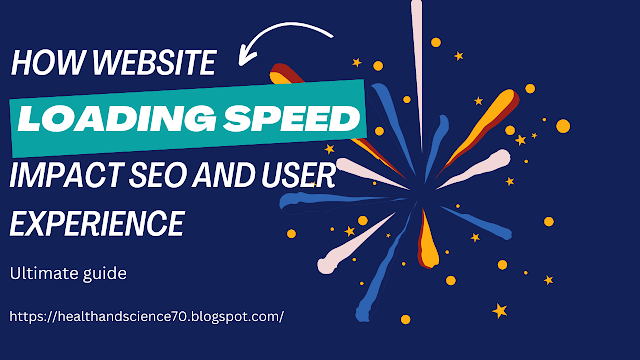How Website Loading Speed Impacts SEO and User
Experience – Ultimate Guide
Introduction
In the digital era, where every second counts, website loading
speed plays a pivotal role in determining the success of a website. Both search
engines and users have high expectations when it comes to website performance.
In this ultimate guide, we will explore the profound impact of website loading
speed on SEO and user experience, as well as practical steps to optimize
loading times and ensure a seamless browsing experience for visitors.
The Significance of Website
Loading Speed
Why is
Loading Speed Important for SEO?
Search engines, such as Google, consider website loading speed as
one of the crucial ranking factors. Faster-loading websites are more likely to
rank higher in search engine result pages (SERPs) than slower ones. This is
because search engines prioritize delivering the best user experience, and
faster websites are perceived to be more user-friendly.
🅡🅔🅐🅓 How to Reduce Bounce Rate and Rank Higher in Search Engine
How Does Website Loading Speed Affect User Experience?
1.
First Impression Matters: Users tend to
form their first impression of a website within seconds of landing on it. A
slow-loading website can leave a negative impression, causing visitors to
bounce back and explore competitors' sites instead.
2.
Bounce Rates and User Engagement: Slow-loading pages often result in higher bounce rates, meaning
users abandon the site without exploring further. On the other hand,
faster-loading websites have higher user engagement and longer average session
durations.
🅡🅔🅐🅓 Effective Techniques to Lower Bounce Rate and Improve Website Performance
3.
Conversion Rates: Website
loading speed directly impacts conversion rates. A delay of just a few seconds
can lead to a significant drop in conversion rates, resulting in lost revenue
and opportunities.
🅡🅔🅐🅓 7 Strategies to Boost Conversion Rates on Your Website
Factors Affecting Website Loading
Speed
1.
Hosting Service
The choice of hosting service can significantly impact loading
times. Shared hosting plans may save costs, but they can also lead to slower
loading times due to sharing server resources with other websites. Upgrading to
a dedicated or VPS hosting plan can provide better loading speeds.
2. Image
Optimization
High-resolution images can be large files that slow down website
loading times. Optimizing images by compressing them without compromising
quality can significantly improve loading speed.
3.
Minimizing HTTP Requests
Reducing the number of elements on a page, such as scripts,
stylesheets, and images, can lead to fewer HTTP requests and faster loading
times.
4.
Caching
Implementing browser caching allows browsers to store certain
website elements, reducing the need to reload the entire page upon each visit.
Steps to Improve Website Loading
Speed
1.
Enable Compression
Use Gzip or Brotli compression to reduce the size of web page
elements before they are sent to the user's browser. This can greatly speed up
the loading process.
2.
Leverage Browser Caching
Set expiration dates for static resources, so browsers can cache
them and avoid repeated downloads, resulting in faster subsequent visits.
3.
Optimize CSS and JavaScript
Minify CSS and JavaScript files to eliminate unnecessary characters
and spaces, reducing their size and speeding up loading times.
4.
Content Delivery Network (CDN)
Use a CDN to spread website content among numerous servers all over
the world. This ensures faster loading times for users regardless of their
geographical location.
Conclusion
The speed of website loading is important for both user experience and SEO. Faster-loading websites are more likely to rank higher in search results and provide visitors with a positive browsing experience. By following the steps mentioned in this ultimate guide, website owners can optimize loading times, boost user engagement, and ultimately enhance their online presence.
FAQs
1. Does
website loading speed affect mobile SEO?
Yes, website loading speed is equally important for mobile SEO.
With the increasing number of users accessing the internet through mobile
devices, search engines prioritize mobile-friendly websites with fast loading
times.
2. Can
website loading speed impact e-commerce sales?
Absolutely. Studies have shown that even a one-second delay in
loading time can lead to a significant drop in e-commerce conversion rates,
affecting sales and revenue.
3. Is it
necessary to achieve a perfect loading speed score?
While aiming for a perfect loading speed score is ideal, real-world
circumstances may vary. Focus on achieving a loading speed that provides a
smooth user experience rather than obsessing over attaining a perfect score.
4. How
often should I monitor website loading speed?
Regular monitoring is crucial, as factors affecting loading speed
can change over time. Check loading times periodically and make necessary
adjustments to ensure optimal performance.
5. Can
third-party plugins impact loading speed?
Yes, third-party plugins and scripts can add additional HTTP
requests and slow down loading times. Evaluate and choose plugins carefully,
and only keep those that are essential for your website's functionality.



0 Comments